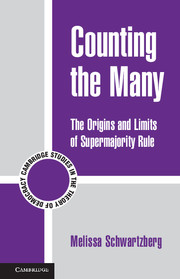1 - Introduction
Published online by Cambridge University Press: 05 June 2014
Summary
Today we encounter supermajority rules in most elements of our social lives. If we choose to purchase a home in a residential community, we are likely to be bound by covenants, rules, and regulations enforced by community associations and secured by strenuous supermajority rules. The school boards that oversee our children’s education may be obliged to use a supermajority rule for issues including the discontinuation of a recently adopted textbook, or standardization of equipment or supplies, and our children’s athletic clubs may have their bylaws subject to a supermajority amendment clause. University professors encounter supermajority rules at many levels, from the initial hiring of faculty to tenure decisions and other decisions made by the board of trustees. Employees of other corporations, both nonprofit and for-profit, abide by decisions implemented by corporate boards that use supermajority rules for governance.
If these norms are common in our private and associative lives, they are nearly ubiquitous in the political realm. In the United States, on both the state and federal levels, laws are regularly subject to supermajority rules for enactment and abrogation. In sixteen states, supermajorities are required to raise taxes. In the Senate, the use – or threat – of filibuster, requiring a three-fifths vote for cloture, rose dramatically in recent years. Constitutions around the globe almost inevitably have recourse to supermajority rules for adoption and amendment.
- Type
- Chapter
- Information
- Counting the ManyThe Origins and Limits of Supermajority Rule, pp. 1 - 16Publisher: Cambridge University PressPrint publication year: 2013



